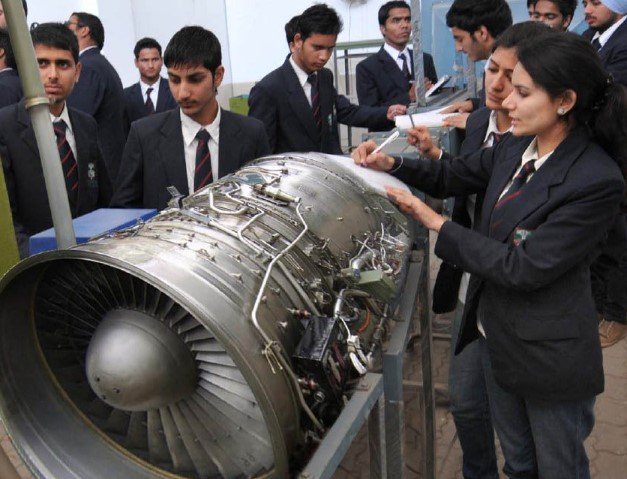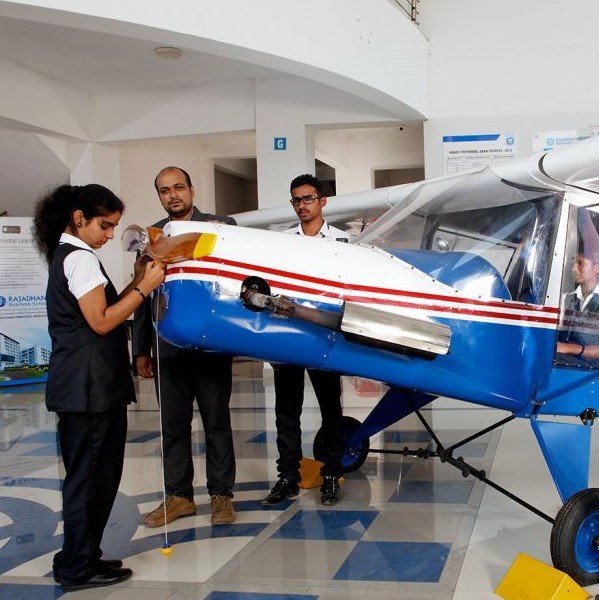The scope of Aeronautical Engineering in India is broadening as the country invests heavily in its aviation and aerospace sectors. With a growing demand for advanced aircraft and innovative aerospace technologies, India offers a range of exciting career opportunities. The sector’s expansion includes advancements in aircraft design, manufacturing, and space exploration, providing numerous prospects for engineers. As the industry evolves, the scope of Aeronautical Engineering in India remains dynamic and promising.
Scope of Aeronautical Engineering in India
To know whether the scope of Aeronautical Engineering in India is growing or not, we need to look into certain aspects like career options, salaries, recruiters, etc in this field. Let us learn all those one by one.
What do You Learn in Aeronautical Engineering?
Aeronautical Engineering students delve into a comprehensive curriculum designed to provide a thorough understanding of aircraft and spacecraft technologies. Below is a detailed overview of key subjects studied in the program:

| Subject | Description |
|---|---|
| Aircraft Design | Focuses on the principles and methodologies for designing aircraft structures, including aerodynamics, materials, and systems to meet safety and performance standards. |
| Aerodynamics | Studies the behavior of air as it interacts with aircraft surfaces, analyzing airflow, lift, drag, and other forces crucial for optimizing performance and stability. |
| Propulsion Systems | Covers the design and functioning of engines and propulsion mechanisms, including jet engines, turboprops, and rockets, emphasizing efficiency and power generation. |
| Flight Mechanics | Examines the principles of aircraft movement, control, and stability, including takeoff, landing, and maneuvering in various flight conditions. |
| Structural Analysis | Investigates the materials and structural components of aircraft, focusing on their strength, durability, and ability to withstand operational stresses. |
| Avionics | Involves the study of electronic systems used in aircraft for communication, navigation, and monitoring, ensuring integration and functionality. |
| Aircraft Systems | Covers the integration and operation of various subsystems within an aircraft, such as hydraulics, fuel systems, and environmental controls. |
| Air Traffic Management | Deals with the procedures and technologies for managing air traffic, ensuring safe and efficient aircraft movement through controlled airspace. |
Top Recruiters Of Aeronautical Engineering
The scope of Aeronautical Engineering in India will continue to grow as the leading aerospace companies and defense organizations grow. These organizations include Boeing, Airbus, HAL, and more. These top employers offer diverse roles, from aircraft design to advanced propulsion systems, shaping the future of aviation and defense. Let us have a detailed look at the private and government career options.
Private Sector
Boeing
- Boeing is a leading aerospace company known for its commercial and military aircraft. In India, Boeing recruits aeronautical engineers for roles in design, manufacturing, and support.
- Vacancies: Boeing India currently has multiple openings for aeronautical engineers in Bengaluru and Delhi, focusing on aircraft design and systems engineering.
Airbus
- Airbus is a global leader in aircraft manufacturing, offering various engineering roles in India. The company is involved in designing, testing, and improving aircraft technologies.
- Vacancies: Airbus India has positions available in Hyderabad and Bengaluru for aeronautical engineers specializing in avionics and aircraft systems.
General Electric
- General Electric is known for its advanced aerospace technologies, including aircraft engines. They hire engineers for roles in design, manufacturing, and testing.
- Vacancies: GE Aviation in Bengaluru is seeking aeronautical engineers for roles in propulsion systems and engine design.
Pratt & Whitney
- Specializing in aircraft engines, Pratt & Whitney offers roles in engine design, manufacturing, and maintenance. They focus on advanced propulsion technologies.
- Vacancies: Pratt & Whitney has openings in Hyderabad for aeronautical engineers to work on engine systems and performance analysis.
TATA Aerospace & Defense
- TATA Aerospace & Defense focuses on manufacturing and designing aerospace systems and defense solutions. They hire engineers for various aerospace projects.
- Vacancies: TATA Aerospace & Defense in Bengaluru is hiring aeronautical engineers for roles in system integration and aircraft maintenance.
Mahindra Aerospace
- Mahindra Aerospace is involved in designing and manufacturing aerospace components. They offer engineering roles in component design and production.
- Vacancies: Mahindra Aerospace in Bengaluru has positions available for engineers specializing in aircraft components and systems.
QuEST Global
- QuEST Global provides engineering services across industries, including aerospace. They offer roles in design, development, and consulting.
- Vacancies: QuEST Global in Bengaluru is looking for aeronautical engineers for roles in product design and development.
Bharat Electronics Limited (BEL)
- BEL specializes in defense electronics and aerospace technologies. They recruit engineers to develop avionics and communication systems.
- Vacancies: BEL in Bengaluru has openings for aeronautical engineers focusing on avionics and radar systems.
Hindustan Aeronautics Limited (HAL)
- HAL is a major defense aerospace manufacturer in India, working on aircraft design, production, and maintenance. They offer a range of engineering roles.
- Vacancies: HAL has multiple vacancies across its facilities for aeronautical engineers in aircraft design, maintenance, and production.
Taneja Aerospace
- Taneja Aerospace is involved in designing and maintaining aerospace systems. They provide engineering roles in various aerospace projects.
- Vacancies: Taneja Aerospace in Bengaluru is hiring aeronautical engineers for aircraft systems and structural analysis roles.
Government Sector
Indian Space Research Organisation (ISRO)
- ISRO focuses on space exploration and satellite technology. They hire engineers for satellite design, launch operations, and space missions.
- Vacancies: ISRO has openings in Bengaluru and other centers for aeronautical engineers specializing in satellite systems and space exploration technologies.
Defense Research and Development Organization (DRDO)
- DRDO is involved in defense research, including aerospace technologies. Engineers work on advanced defense systems and missile technology.
- Vacancies: DRDO has positions for aeronautical engineers in Delhi and various regional labs
National Aerospace Laboratories (NAL)
- NAL focuses on aerospace research and technology development. They hire engineers for research roles and technological advancements in aircraft and systems.
- Vacancies: NAL in Bengaluru is recruiting aeronautical engineers for roles in aerospace research, including aircraft design and materials development.
Indian Air Force (IAF)
- The IAF manages and operates military aircraft and supports defense aviation. Engineers work on aircraft maintenance and operational support.
- Vacancies: The IAF is recruiting aeronautical engineers for roles in aircraft maintenance, operations, and systems management.
Indian Navy
- The Indian Navy operates naval aviation assets and requires engineers to maintain and operate these systems.
- Vacancies: The Indian Navy has openings for aeronautical engineers in roles related to naval aviation systems and maintenance.
Gas Turbine Research Establishment (GTRE)
- GTRE focuses on gas turbine research and development for aircraft engines. Engineers work on advanced propulsion systems and engine technologies.
- Vacancies: GTRE in Bengaluru is hiring aeronautical engineers for research roles in gas turbines and propulsion systems.
Aeronautical Development Agency (ADA)
- ADA works to develop indigenous aerospace technologies, including advanced fighter aircraft. They offer roles in design, development, and testing.
- Vacancies: ADA has openings for aeronautical engineers in Bengaluru for roles related to the development of advanced aircraft and defense systems.
Aeronautical Development Establishment (ADE)
- ADE focuses on developing aerospace systems and technologies. Engineers are involved in various projects related to aircraft and defense systems.
- Vacancies: ADE in Bengaluru is recruiting aeronautical engineers for roles in the development and testing of aerospace technologies.
Directorate General of Civil Aviation (DGCA)
- The DGCA oversees aviation safety and regulations in India. Engineers work on regulatory compliance and safety standards.
- Vacancies: DGCA has positions available for aeronautical engineers in roles related to aviation safety, regulatory compliance, and airworthiness.
Career Options & Salaries after B.Tech Aeronautical Engineering Graduates
B.Tech Aeronautical Engineering graduates have access to varied career paths such as aircraft design, flight testing, and air traffic control. Salary ranges differ by role and experience level, reflecting the industry’s high demand for specialized engineering skills. Let us have a look at the career options and their salary ranges for all the experience levels.
| Role | Description | Entry Level Salary | Mid Level Salary | Senior Level Salary |
|---|---|---|---|---|
| Aircraft Design Engineer | Responsible for designing and developing aircraft structures and systems. | ₹60,000 – ₹80,000 per month | ₹80,000 – ₹1,20,000 per month | ₹1,20,000 – ₹1,50,000 per month |
| Aerospace Systems Engineer | Focuses on integrating and optimizing systems within aircraft or spacecraft. | ₹70,000 – ₹90,000 per month | ₹90,000 – ₹1,30,000 per month | ₹1,30,000 – ₹1,60,000 per month |
| Flight Test Engineer | Conducts tests to evaluate aircraft performance, safety, and reliability. | ₹80,000 – ₹1,00,000 per month | ₹1,00,000 – ₹1,40,000 per month | ₹1,40,000 – ₹1,80,000 per month |
| Maintenance, Repair, and Overhaul (MRO) Specialist | Handles the maintenance, repair, and overhaul of aircraft. | ₹50,000 – ₹70,000 per month | ₹70,000 – ₹1,00,000 per month | ₹1,00,000 – ₹1,30,000 per month |
| Avionics Engineer | Works on the electronic systems used in aircraft, including navigation, communication, and control systems. | ₹60,000 – ₹80,000 per month | ₹80,000 – ₹1,20,000 per month | ₹1,20,000 – ₹1,50,000 per month |
| Air Traffic Controller | Manages and directs aircraft movements within controlled airspace. | ₹70,000 – ₹90,000 per month | ₹90,000 – ₹1,30,000 per month | ₹1,30,000 – ₹1,60,000 per month |
| Defense Service | Works on military aircraft, defense systems, and related technologies. | ₹90,000 – ₹1,10,000 per month | ₹1,10,000 – ₹1,50,000 per month | ₹1,50,000 – ₹2,00,000 per month |
| Govt. Research Labs | Involves advanced research in aerospace technologies and defense systems. | ₹70,000 – ₹90,000 per month | ₹90,000 – ₹1,30,000 per month | ₹1,30,000 – ₹1,60,000 per month |
| Commercial Airlines | Works on aircraft maintenance, design improvements, and operational efficiency. | ₹60,000 – ₹80,000 per month | ₹80,000 – ₹1,20,000 per month | ₹1,20,000 – ₹1,50,000 per month |
| Aeronautical Development Agency (ADA) and Aeronautical Development Establishment (ADE) | Develops and enhances indigenous aerospace technologies. | ₹80,000 – ₹1,00,000 per month | ₹1,00,000 – ₹1,40,000 per month | ₹1,40,000 – ₹1,80,000 per month |
| Private Industries | Works on a wide range of aerospace technologies, from engine design to system integration. | ₹70,000 – ₹90,000 per month | ₹90,000 – ₹1,30,000 per month | ₹1,30,000 – ₹1,60,000 per month |
| Directorate General of Civil Aviation (DGCA) | Regulates aviation safety and standards in India. | ₹60,000 – ₹80,000 per month | ₹80,000 – ₹1,20,000 per month | ₹1,20,000 – ₹1,50,000 per month |
| Airport Design and Administration | Focuses on infrastructure planning, design, and management of airport facilities. | ₹50,000 – ₹70,000 per month | ₹70,000 – ₹1,00,000 per month | ₹1,00,000 – ₹1,30,000 per month |
| Drone Design and Manufacturing | Works on the design, development, and manufacturing of drones. | ₹60,000 – ₹80,000 per month | ₹80,000 – ₹1,20,000 per month | ₹1,20,000 – ₹1,50,000 per month |
Performance of Aeronautical Engineering Colleges in India
Top aeronautical engineering colleges in India, like IIT Bombay and IIT Kanpur, demonstrate strong performance with high placement rates and significant industry collaborations. Their graduates often secure positions with leading aerospace firms and research organizations. The scope of aeronautical engineering in India is relatively higher if you pursue your degree here.
Top Aeronautical Engineering Colleges in India
| College | Ranking | Average Placement (%) | Top Recruiters | Average Salary | Number of Students | Faculty Strength | Research Grants | Industry Collaboration |
|---|---|---|---|---|---|---|---|---|
| IIT Bombay | 1 | 85% | HAL, Boeing, Airbus | ₹10-15 lakhs | 200 | 50 | ₹50 crore | High |
| IIT Kanpur | 2 | 80% | ISRO, HAL, Boeing | ₹9-14 lakhs | 180 | 45 | ₹45 crore | High |
| Pune Institute of Aviation | 3 | 75% | Air India, HAL | ₹7-12 lakhs | 150 | 40 | ₹20 crore | Medium |
| Bangalore Institute of Tech | 4 | 70% | Airbus, Boeing | ₹6-11 lakhs | 170 | 55 | ₹25 crore | Medium |
| Amrita University | 5 | 68% | GE Aviation, TATA Aerospace | ₹6-10 lakhs | 160 | 30 | ₹15 crore | Low |
Overall Performance of Aeronautical Engineering in India
When talking about the entire Aeronautical engineering colleges in India, the performance is still good and projected to grow as well. Moreover, India’s aeronautical engineering sector is robust, with a substantial number of graduates entering the workforce annually. High placement rates and substantial research funding underscore the field’s growing importance and its alignment with national aerospace ambitions.
| Metric | Statistic |
|---|---|
| Total Engineers Graduated | 10,000 annually |
| Number of Placed Students | 70% |
| Top Recruiters in India | HAL, Boeing, ISRO, Airbus |
| Average Salary for Fresh Graduates | ₹6-10 lakhs per annum |
| Number of Engineering Colleges | 150 |
| Industry Partnerships | High |
| Research Grants in Aerospace | ₹200 crore annually |
Aeronautical Engineering vs. Aerospace Engineering in India
Now, let’s also talk about Aerospace Engineering as many students are wondering what is the difference. Aeronautical Engineering focuses on aircraft design and maintenance, while Aerospace Engineering encompasses both aircraft and spacecraft technologies. You can make a career in Aerospace even though you have studied Aeronautical Engineering. Understanding these differences can guide career choices and educational paths within India’s expanding aerospace sector.
Aeronautical engineers can enter the aerospace industry by leveraging their expertise in aircraft systems and pursuing further education in aerospace technologies, while aerospace engineers can transition to aeronautics by applying their skills in spacecraft design to aircraft systems, gaining industry-specific knowledge, and engaging in relevant projects and networks.
Similarities
Aeronautical and Aerospace Engineering share similarities, such as principles of flight dynamics and propulsion systems. Both fields require a strong foundation in physics and mathematics to understand aircraft and spacecraft design.
Differences
| Aspect | Aeronautical Engineering | Aerospace Engineering |
|---|---|---|
| Focus | Aircraft design and maintenance | Spacecraft and satellite design |
| Career Scope | Aircraft manufacturing, MRO, avionics | Space missions, satellite technology |
| Typical Industries | Airlines, defense, aircraft manufacturers | Space agencies, satellite companies |
| Job Roles | Flight test engineer, aircraft designer | Spacecraft systems engineer, satellite designer |
Emerging Trends & Scope of Aeronautical Engineering in India
India has seen a lot of significant advancements transforming the aeronautics. Innovations like electric aircraft, urban air mobility, advanced materials, and autonomous systems are reshaping how we think about aviation and space travel. These developments not only promise to reduce environmental impact and enhance urban transport but also create new career opportunities in design, materials science, and regulatory compliance. Let us now see the recent trends in the field of aeronautics.
Electric Aircraft
- Companies like Pipistrel are testing electric aircraft in India. This trend is set to reduce carbon emissions and operational costs.
- Employment Impact: The rise of electric aircraft will create opportunities for engineers in design, battery technology, and propulsion systems.
Urban Air Mobility (UAM)
- Firms like Volocopter are exploring UAM solutions in Indian cities. These vehicles aim to alleviate traffic congestion and enhance urban transport.
- Employment Impact: UAM development will generate jobs in vehicle design, infrastructure planning, and regulatory compliance.
Advanced Materials
- Advanced materials are being used in aircraft by companies like HAL to improve performance and reduce weight.
- Employment Impact: Engineers will be needed for research and development in material science and structural design.
Autonomous Aircraft
- Companies such as Aurora Flight Sciences are advancing autonomous aircraft technology. This includes pilotless commercial and defense aircraft.
- Employment Impact: The growth of autonomous aircraft will lead to roles in system design, AI integration, and safety assessment.
Hypersonic Flight
- The Defense Research and Development Organization (DRDO) is working on hypersonic flight technologies to enhance missile capabilities.
- Employment Impact: Engineers will be required for hypersonic vehicle design, propulsion systems, and testing.
Space Tourism
- Space tourism initiatives by organizations like ISRO aim to make space travel accessible, with developments in spacecraft design and safety.
- Employment Impact: Space tourism will increase demand for engineers in spacecraft development, mission planning, and space travel logistics.
Challenges Faced by Aeronautical Engineers
Aeronautical engineers face several challenges in their field, which can impact their work and the industry as a whole.
Technological Complexity
Advancements in technology lead to increased complexity in aircraft and spacecraft systems, requiring engineers to continuously upgrade their skills and knowledge.
Regulatory Compliance
Engineers must navigate complex regulatory frameworks to ensure that designs and operations meet stringent safety and environmental standards, which can be time-consuming and challenging.
High Costs
The cost of developing and manufacturing aerospace technologies is high, which can limit innovation and require engineers to work within strict budget constraints.
Safety and Reliability
Ensuring the safety and reliability of aircraft and spacecraft is critical, demanding rigorous testing and quality assurance to prevent failures and ensure operational safety.
Skill Shortage
There is a shortage of skilled aeronautical engineers, which can create challenges in staffing projects and maintaining high levels of expertise within the industry.
Conclusion
The scope of Aeronautical Engineering in India is expansive and growing, driven by advancements in aviation technology and increasing demand for innovative aerospace solutions. With diverse career opportunities, emerging trends, and evolving challenges, the field promises a dynamic and rewarding future. The ongoing developments in aeronautical engineering highlight its crucial role in shaping the future of aviation and space exploration in India.
Also Read:
Top 10 Aeronautical Engineering Colleges in Bangalore
Aeronautical Engineering Colleges in Tamilnadu 2024 – Explore the Best!






